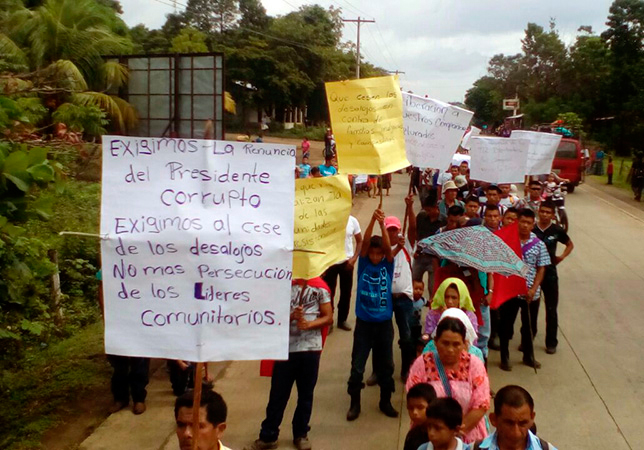
Nov 30, 2018 | Events
The conference on business and human rights in the Department of Izabal, Guatemala was held at the University of Geneva on 29 November 2018 and co-hosted with the Department of Public International Law and International Organization, Faculty of Law of the University of Geneva and the City of Geneva.
The main issue under review was the impact on the local communities of the operations of the Compañia Guatemalteca de Nickel (CGN-ProNico) a nickel mining company in El Estor, wholly owned by Solway Investment Group, a company registered in Zug, Switzerland.
Speaking at the conference, Prof. Marco Sassòli, a Commissioner of the International Commission of Jurists (ICJ), recommended there be an international mission to Izabal, Guatemala in order to understand the problems facing the local Q’eqchis communities as a result of the Solway nickel mining operations.
Other speakers included Ramon Cadena, the Director of the ICJ Central America office, Amalia Caal Coc, from the Guillermo Torielo Foundation in Izabal, Guatemala, Maynor Alvarez, the manager of the CGN Community Affairs Department, and Sandra Epal Ratjen, Deputb Executive Director at Franciscans International.
Dr Antonella Angelini from the Department of Public International Law and an expert in business and human rights was the conference moderator.
A more detailed account of the conference proceedings is available (download).
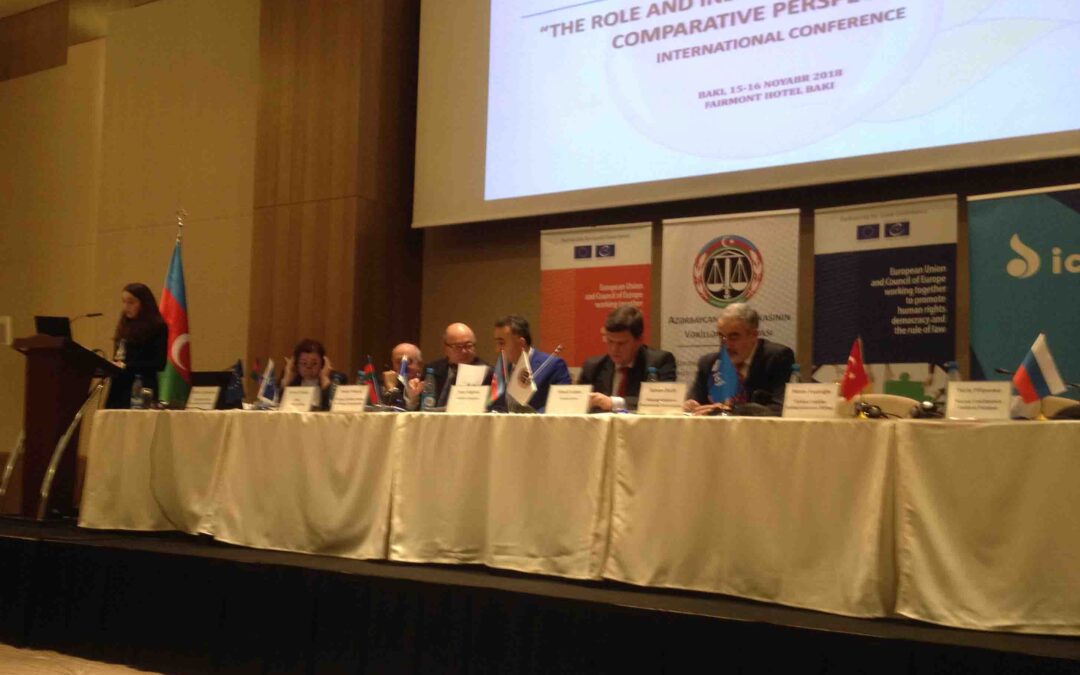
Nov 30, 2018 | News
The International Commission of Jurists (ICJ) together with the Council of Europe and the Azerbaijan Bar Association held the international conference on the independence of the legal profession in Azerbaijan on 15-16 November 2018.
The conference on the Role and Independence of Lawyers brought together comparative perspectives from countries of the Council of Europe region and Central Asia as well as from international organizations. Representatives of bar associations and individual lawyers from Azerbaijan, Georgia, Kazakhstan, the Netherlands, the Russian Federation, Switzerland, Turkey, Ukraine, the United Kingdom and Uzbekistan shared their experiences and best practices in addressing challenges to the independence of lawyers.
The ICJ considers the conference to be a landmark event which has created much-needed space for further dialogue on the issue of independence of lawyers in Azerbaijan both with the national and international stakeholders.
The ICJ appreciates the engagement of the Azerbaijan Bar Association and the open debate on these issues at the conference, as a step towards implementation of its previous recommendations that the Bar Association “should initiate, through a consultative process, an internal reform based on the principles of independence of the profession, high standards of legal practice, the protection of lawyers from threats, harassment and hindrance in their work, and the democratic participation of its members.” Defenseless Defenders: Systemic Problems in the Legal Profession of Azerbaijan
The ICJ stresses the need for the Azerbaijan authorities to respect both the institutional independence of the legal profession, and the individual independence of lawyers, in accordance with the international standards outlined at the conference and in the above-mentioned report. Decisions of competent international human rights authorities, including the European Court of the Human Rights, in cases concerning the rights of lawyers, must be implemented in full.
The ICJ looks forward to future dialogue and co-operation with the Azerbaijan Bar Association and other concerned stakeholders in Azerbaijan on the essential elements of an independent legal profession, including as regards lawyers’ professional ethics, qualification of lawyers and the disciplinary system. The new impetus for international engagement on these issues creates room for discussing the most acute institutional challenges and individual cases where the independence of the legal profession may be at stake.
Speaking at the Conference, Róisín Pillay, Director of the ICJ Europe and Central Asia Programme said that “the requirement of independence places responsibilities not only on the bar association itself but also on the executive and legislative powers to respect this independence, refrain from interference, and put in place – and respect in practice – appropriate legislative and institutional safeguards.”
Participants underscored problems relating to the ethical responsibilities of lawyers and their enforcement in disciplinary proceedings, in particular as regards potential friction with the exercise of freedom of expression of lawyers.
Temur Shakirov, ICJ Senior Legal Adviser, focused on the independence of lawyers as an ethical requirement of individual lawyers, saying that “Independence is an essential principle both for the bar association as an institution and for an individual lawyer. It is known that the institutional independence of the legal profession should be ensured, in accordance with international standards, both in law and in practice. However, the independence of lawyers is also an ethical requirement for each lawyer.”
Henry Reznik, Vice-President of the Federal Chamber of Lawyers of the Russian Federation, stressed in his presentation that “the primary role of the association of lawyers is to protect their [lawyers’] independence and freedom.” He added that “Advokatura is an institute of the civil society. Advokatura is not part of the State and municipal bodies. And Advokatura must have the trust of the society.”
Yuri Pilipenko, President of the Federal Chamber of Lawyers of the Russian Federation, highlighted the natural tensions between the legal profession and government, noting that “… the government and an independent self-regulating professional organization, which has goals to protect rights and freedoms and access to justice, are by definition opponents in a certain sense.”
In his concluding remarks at the Conference, Anar Baghirov, President of the Azerbaijan Bar Association, highlighted that the most crucial mission of the Bar Association was “to protect interests of lawyers and the institutionalized legal profession.”
In that regard he mentioned the need for modification of the Law on Advocates and Advocates’ Activity, stating that the most important role of the Bar Association should be reflected in the law. In addition, among other things he mentioned that issues to be addressed included the number of lawyers, increasing availability of pro bono legal aid, enhancing lawyers’ professional capacity, and cooperation with other countries’ bar associations and international organizations.
In his closing remarks at the Conference, ICJ Secretary General Sam Zarifi stressed the importance of lawyers in the protection of human rights and the rule of law. He stressed that around the world, lawyers were attacked because of their role in defence of their clients: for what they say, what the individuals they represent say, and that such attacks violate the clear prohibition of identifying lawyers with their clients.
He stressed the key role of the bar association in this regard: “To maintain the role of lawyers we have heard again and again how important it is that lawyers have the independence and an association that can pretend this independence. It is part of international law and standards and we would like that standard to be implemented around the world and of course here [in Azerbaijan]. We need bar associations, which are independent and strong to defend the independence of lawyers.”
The ICJ will continue to closely follow issues of the independence and role of lawyers in Azerbaijan. It will continue its international engagement on such matters including with UN and Council of Europe institutions, as well as with lawyers and civil society in Azerbaijan in order to facilitate the independence of lawyers, their protection from harassment and reprisals, and other key principles in line with the UN Basic Principles on the Role of Lawyers.
Background information
Problems regarding independence of the legal profession in Azerbaijan were outlined in the ICJ report “Defenseless Defenders: Systemic Problems in the Legal Profession of Azerbaijan” https://www.icj.org/azerbaijan-the-independence-and-role-of-lawyers-must-be-respected-icj-report-says/
The ICJ has raised concerns regarding cases of abusive disciplinary proceedings and other threats to the independence of lawyers, including:
Cases of Democracy and Human Rights Resource Centre v. Azerbaijan and Mustafayev and Democracy and Human Rights Resource Centre v. Azerbaijan: https://www.icj.org/azerbaijan-icj-intervenes-before-european-court-of-human-rights-in-defence-of-harassed-lawyers-and-civil-society/
Azerbaijan: Lawyer Irada Javadova disbarment decided in unfair proceedings, https://www.icj.org/azerbaijan-lawyer-irada-javadova-disbarment-decided-in-unfair-proceedings/
Alayif Hasan oglu Hasanov v. Azerbaijan case: https://www.icj.org/azerbaijan-icj-intervenes-before-the-european-court-of-human-rights-in-a-case-concerning-restrictions-of-lawyers-rights/
Cases of Annagi Hajibeyli, Khalid Bagirovand Intigam Aliyev v Azerbaijan, https://www.icj.org/wp-content/uploads/2016/11/ICJ-Bagirovothers-AmicusBrief-Azerbaijan-2016-Final.pdf
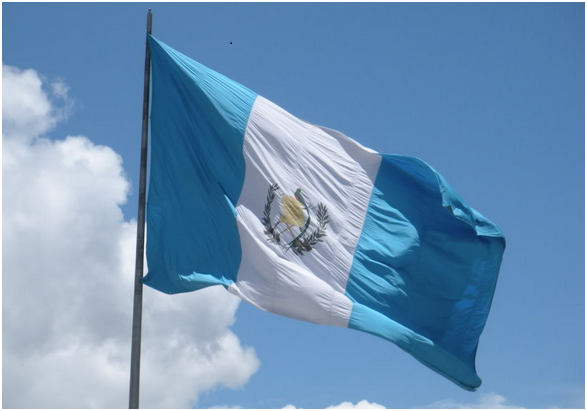
Nov 28, 2018 | Events, News
A conference on the situation of business and human rights in Izabal, Guatemala will be held on 29 November 2018 at UNIMAIL University of Geneva at 6:30 pm.
THIS CONFERENCE IS IN FRENCH AND SPANISH ONLY
The conference is co-organised by the International Commission of Jurists, the Department of International Public Law and International Organisation, Faculty of Law, University of Geneva and the Town of Geneva.
Speakers at the conference include Ramon Cadena, the Director of the ICJ Central America Office, Amalia Caal Coc, a local community leader from the Guilermo Torielo Foundation, Maynor Alvarez, Director of Community Relations from the Guatemalan Nickel Company, Solway Group, and Sandra Ratjen, Franciscans International. The panel moderator is Dr Antonella Angelini from the Department of International Public Law and International Organisation.
The meeting room is R070 at UNIMAIL, There will be a discussion after the panel. Entrance is free and there will be interpretation in French and Spanish.
Flyer in Spanish (PDF)
Flyer in French (PDF)
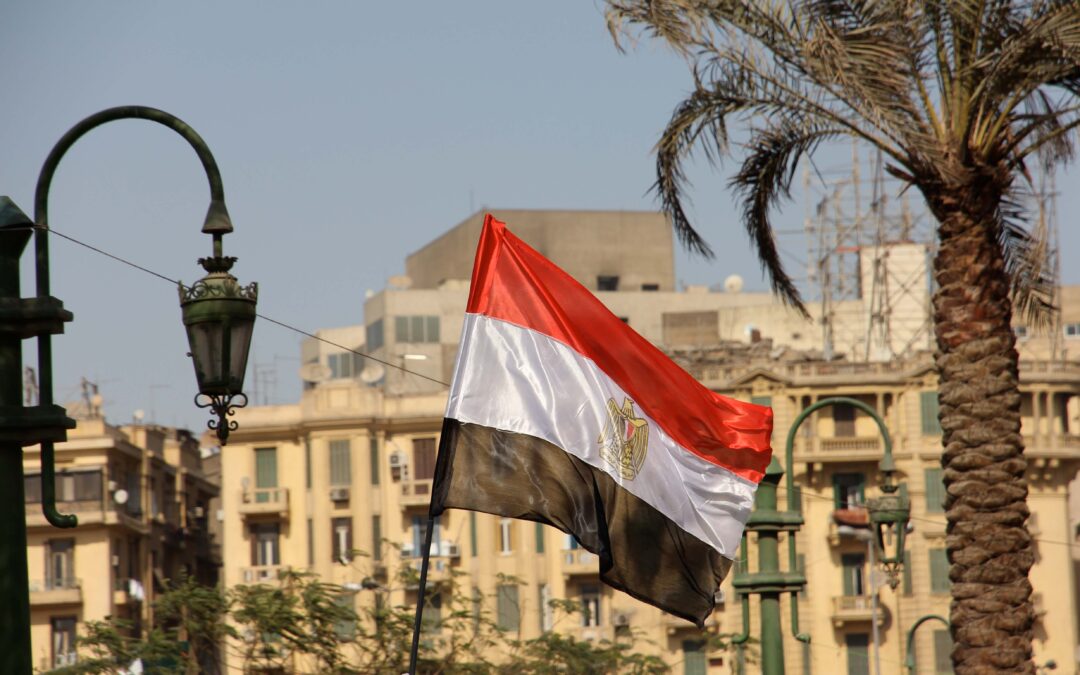
Nov 28, 2018 | News
The Egyptian authorities must drop the charges against nine detainees arrested on 1 November 2018 and immediately and unconditionally release them and at least 31 others arrested and in some cases “disappeared” since late October 2018, or otherwise charge them with a recognizable crime consistent with international law, the ICJ said today.
Those arrested in the present sweeps include human rights defenders (HRDs), lawyers, and political activists and persons otherwise providing support to political detainees. Reports indicate that at least some of those detained are connected to the Muslim Brotherhood. The ICJ is concerned that many if not all of these detainees are being held solely for political reasons.
On Wednesday 21 November, nine detainees held since 1 November 2018—Hoda Abdel Moneim, Mohamed Abu Hurayra, Bahaa Auda, Aisha Al Shater, Ahmed El Hodeiby, Mohamed El Hodeiby, Somaya Nassef, Marwa Madbouly and Ibrahim Atta—were interrogated by the State Security Prosecution, who ordered they be held in pre-trial detention for 15 days.
According to information available to the ICJ, the prosecution charged the nine with joining and funding a terrorist organization and incitement to harm the national economy under Egypt’s Counter-Terrorism Law No. 94/2015 (Case No. 1552/ 2018).
Lawyers representing the detainees were not permitted to access the case files, nor were they allowed to speak with the defendants in private. One of the detainees interrogated on 21 November was also interrogated on 19 November 2018 without the presence of a lawyer. It is unclear when the State Security Prosecution ordered their pre-trial detention.
At least three other detainees also appear to have been interrogated on 24 November 2018, including Ahmed Saad, Ahmed Ma’touk and Sahar Hathout. No information is known about whether an order for their pre-trial detention has been issued.
“These arbitrary arrests and trumped up charges are yet another example of the relentless assault by the military and government on the exercise of the rights to freedom of expression and association and to take part in political activity,” said Said Benarbia, ICJ’s MENA Programme Director. “Targeting anyone having any connection to opposition groups under the government’s ‘war on terrorism’ erodes the rule of law in Egypt, undermines human rights, and means there’s now very little, if any, room to carry out human rights work.”
According to public reports, at least 31 others were arrested by Egyptian authorities in raids in late October or early November 2018. Despite repeated calls on the authorities to provide information regarding their location, their whereabouts remain unknown, raising serious concerns for their health and safety. After human rights lawyer Hoda Abdel Moneim—one of the nine now charged—was held incommunicado for 21 days, her family issued a statement expressing concern about her “dire [physical and psychological] health condition.”
It is well established that the Egyptian authorities engage in the widespread and systematic use of torture. Although Egypt’s Constitution, Criminal Procedure Code and Penal Code require that detainees be held in official places of detention with judicial oversight and prohibit torture and other mistreatment, these safeguards have proven ineffective in practice.
The United Nations Committee Against Torture previously reported on the torture of hundreds of people disappeared by the Egyptian authorities. The ICJ is concerned about the high probability that these detainees have been tortured.
“The authorities should unconditionally and immediately release those arrested solely for exercising their human rights and fundamental freedoms, bring any others immediately before a judge to review whether there is any lawful basis for their detention and for any charges brought, and ensure that all those deprived of their liberty are protected against torture and other ill-treatment,” said Said Benarbia.
Contact:
Said Benarbia, Director of the ICJ Middle East and North Africa Programme, t: +41-22-979-3817; e: said.benarbia(a)icj.org
Background
Among those arrested in late October and early November 2018 were human rights lawyer and former spokesperson of the ECRF, Mohammed Abu Hureira, and his wife, Aisha al-Shater, daughter of imprisoned deputy chairman of the Muslim Brotherhood, Khairat al-Shater, as well as human rights lawyer Hoda Abdelmoniem, a former member of the National Council for Human Rights, who was arrested at her home after it was raided without warrant. At least eight of the 40 arrested are women. Reports from local human rights lawyers and organizations suggest that the number of persons arrested and arbitrarily detained could be higher.
The arrests are part of Egypt’s orchestrated crackdown on human rights work, in which human rights defenders and critics are arbitrarily arrested and detained, subjected to enforced disappearance, prosecuted in unfair trials, and sometimes sentenced to death. Two other members of the ECRF, including its Executive Director, were arrested in March 2018 and forcibly disappeared in September after an Egyptian Court ordered their release. Following the latest arrests, the ECRF—which documents enforced disappearances and Egypt’s increasing application of the death penalty—suspended its operations in protest.
On 10 September 2018, the Cairo Criminal Court convicted 739 defendants for their participation in the Raba’a Al Adaweyya square protests in August 2013 after a grossly unfair trial, sentencing 75 defendants to death and 658 defendants to life or five to 15 years’ imprisonment.
On 24 April 2018, following an unfair trial, the Cairo military court convicted former judge and former head of the Central Auditing Authority, Hisham Geneina, to five years in prison for “publishing false information harmful to the national security.”
The arrests place Egypt in breach of its international legal obligations, including under the International Convention on Civil and Political Rights (ICCPR). Article 9 of the ICCPR protects freedom from arbitrary arrest and detention and imposes an obligation on States to ensure a number of protections in respect of detention.
These include the requirement that detainees be brought promptly before a judge so their detention can be reviewed; have the right independently to challenge the lawfulness of their detention; and have the right to access legal counsel. Article 14 of the ICCPR also requires states to ensure detainees have access to legal counsel. Judicial oversight of detention is particularly necessary to protect detainees from torture and cruel, inhumane and degrading treatment.
Articles 19, 22 and 25 of the ICCPR also protect the rights to freedom of expression, to freedom of association and to participate in public affairs. Articles 5-8 of the United Nations Declaration on Human Rights Defenders similarly protects such rights exercised by HRDs and Article 12 requires states to protect HRDs from violence, threats, retaliation, de facto or de jure adverse discrimination, pressure or any other arbitrary action for the lawful exercise of such rights.
Under Egyptian Law, Article 56 of the Constitution and Articles 41-42 of the Criminal Procedure Code require that detainees be held in official places of detention and subject to judicial supervision, including judicial power to inspect places of detention and review each detainee’s case. Articles 51-52 and 55 of the Constitution, Article 40 of the Criminal Procedure Code and Article 126 of the Penal Code prohibit torture and other mistreatment.
In June 2018, the ICJ expressed its concerns about Egypt’s repeated renewals of the State of Emergency since April 2017, and the use of the state of emergency to suppress the activities of and persecute students, human rights defenders, political activists, union members and those suspected of opposing the government.
Egypt-November Arrests-News-Web Story-2018-ARA (PDF in Arabic)
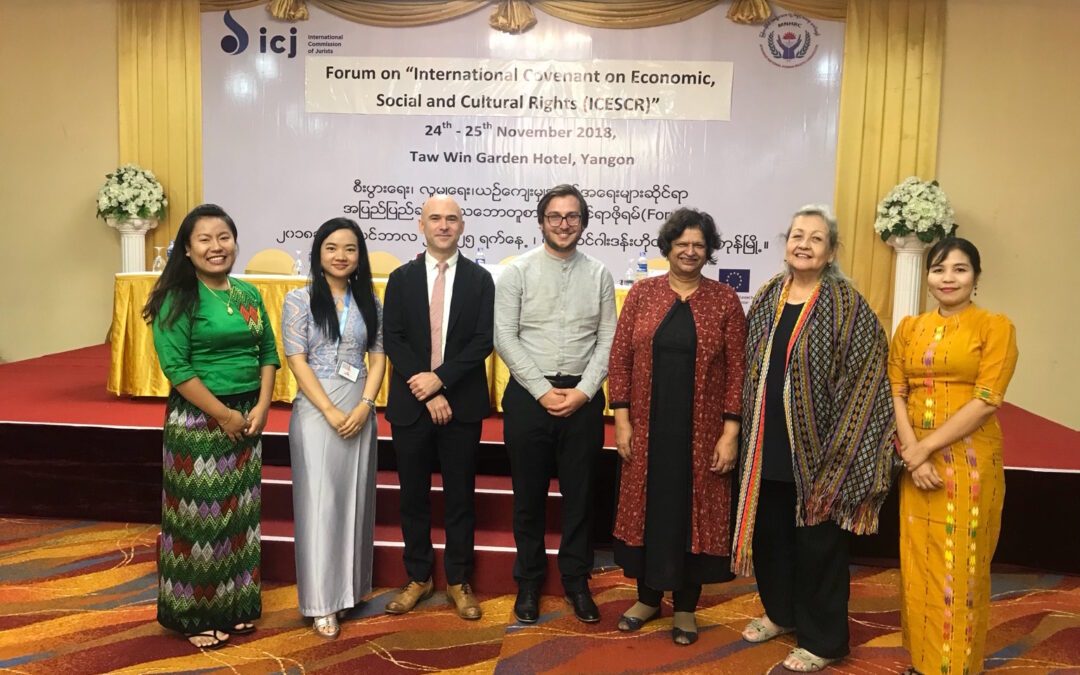
Nov 26, 2018 | News
The ICJ convened a Forum of international legal experts and Myanmar civil society actors in Yangon from the 24 to 25 November 2018 on Myanmar’s obligations under the International Covenant on Economic, Social and Cultural Rights (ICESCR).
Representing each of Myanmar’s 14 States and Regions, more than 130 civil society members attended the event, which was co-hosted with the Myanmar National Human Rights Commission in collaboration with Dan Church Aid, Norwegian Church Aid, Equality Myanmar and the Local Resource Center.
The ICJ’s Asia Pacific Regional Director, Frederick Rawski, introduced the Forum objectives which were to raise awareness of the rights, obligations and reporting processes associated with Myanmar’s ratification of the ICESCR on 6 October 2017.
As a State Party to the ICESCR, Myanmar is obliged to respect, protect and fulfill a variety of human rights including the rights to: decent work, an adequate standard of living, adequate housing, food, water and sanitation, social security, health, and education.
The Chairperson of the UN Committee on Economic, Social and Cultural Rights, Virginia Brás Gomes, discussed the vital role civil society plays in documenting and providing information about human rights challenges, and advocating for law to be enforced and interpreted in compliance with the State’s international law obligations.
Virginia B. Dandan of the Philippines, a former Chairperson of the Committee, described the rights protected under ICESCR and highlighted the universality of human rights and the indivisibility of economic, social and cultural rights from other human rights including protection from discrimination.
Visiting Myanmar from the ICJ’s Southern Africa Office, legal adviser Timothy Fish Hodgson, ICJ Legal Adviser in the ICJ Africa Programme, discussed from a comparative perspective the justiciability of ESC rights in South Africa, and the roles lawyers and other civil society actors have played in progressing rights protections.
Legal advisers from the ICJ’s Myanmar Team moderated a series of panel discussions where civil society representatives discussed challenges and opportunities related to the realization of ESC rights in Myanmar.
Separate to this initiative, the visiting international experts also travelled to Nay Pyi Taw to engage with government. Myanmar’s first State report to the ESCR Committee is due in late 2019, also opening opportunities for civil society engagement.
This event was part of the ICJ’s ongoing effort to convene civil society actors to discuss the promotion and protection of human rights through legal mechanisms.









